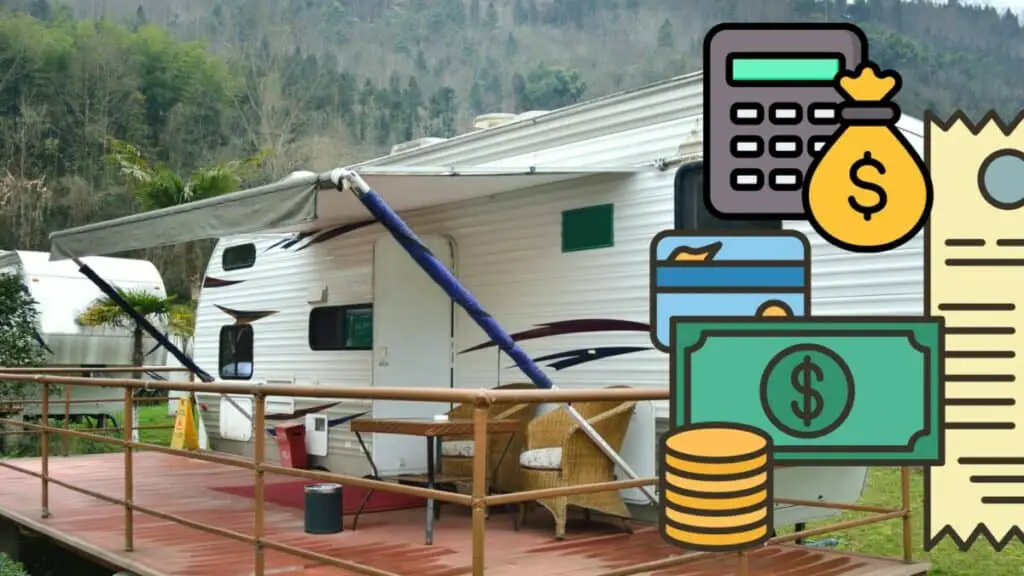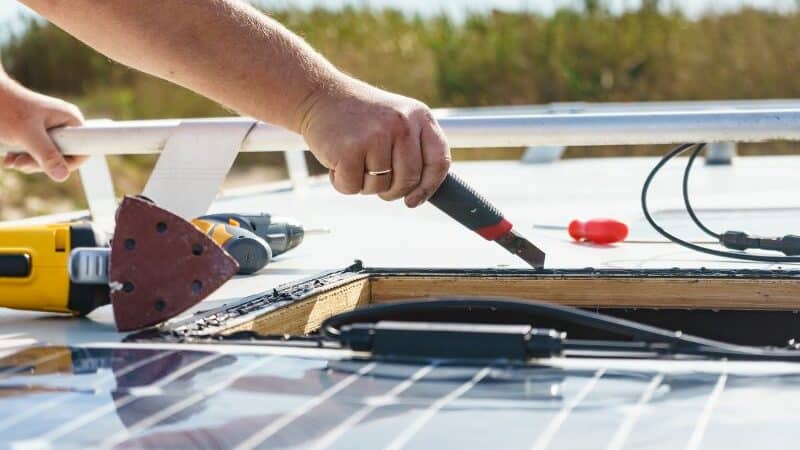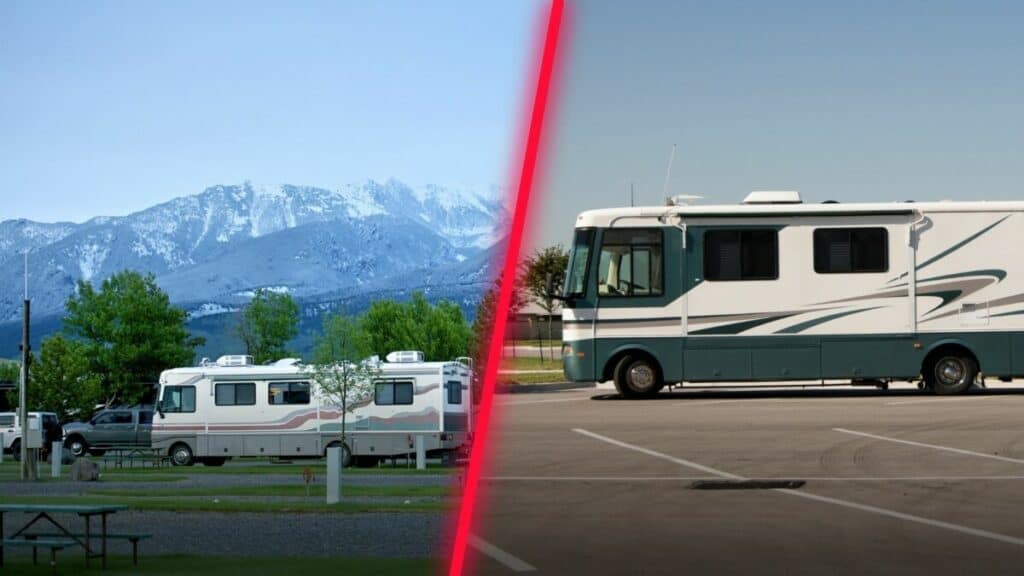This post contains affiliate links (I get a commission at no extra cost to you for purchases made through links in this post).

So you’ve decided to pursue RV life–congratulations! While it can be challenging living on the road, it’s also an incredible experience. However, you’ll have to plan well, and creating a reasonable and accurate budget is one of the most important steps in pursuing your new lifestyle.
The cost to live in a stationary RV depends on the type of RV and where you’re staying, but you can count on your monthly expenses being anywhere from $1,000 to $3,000 a month. For many, living in an RV is cost-effective. However, some factors can make it as expensive as renting or owning a home.
Below, I’ll break down all the things you need to consider in your budget as you decide whether or not it’s cost-effective for you to live in a stationary RV.
Factors Contributing to Permanent RV Living Costs
If you want to live in an RV permanently, you’ll need to consider a few factors. Knowing what to expect, you can better prepare for the expenses and avoid surprises. If you’re considering permanent RV living, it’s important to research these factors before deciding what kind of lifestyle will work best for you and your family. These include:
- Cost of the RV (maintenance, insurance, and other fees).
- Camping fees.
- Amenities (such as laundry or electricity).
- Gas and travel time.
- Phone, WiFi, and groceries.
Generally speaking, it costs between $1,000 and $3,000 per month to live in a stationary RV. However, this depends a lot on your spending habits and how frugally you want to live. If you are boondocking all the time, you could even cut the costs a bit below $1,000 but not too much, and you will see why.
Cost of the RV
Of course, the first cost to consider is the cost of your stationary RV. There are four classes of RVs, each with varying costs:
- Class A
- Class B
- Class C
- Converted passenger vehicles
The amount you pay each month will depend on how you obtained the RV. However, if you have the means to buy the thing outright, at least you won’t have to worry about monthly loan fees.
If you have a loan on your RV, it’s important to remember that you’ll need to make monthly payments. Generally speaking, the longer the loan period is for an RV, the higher your monthly payments will be. If this concerns you and makes budgeting difficult, consider whether paying cash for an RV would work better for your situation.

Maintenance, however, is one of the main factors affecting how much it costs to live in an RV. This includes everything from oil changes to tire rotations and what you’d expect of a typical home, such as:
- Fixing broken appliances.
- Repairing leaks on your roof.
- Cleaning gutters.
- Replacing burned-out light bulbs.
Some people end up spending more than half their paychecks on these kinds of expenses! Additionally, consider the costs of the paperwork.
Insurance is required in most states. In fact, insurance is required for pretty much every type of vehicle.
The fees and licenses you will need to obtain depend on the state in which you live. The process of applying for a license is similar across different states. You’ll also likely have to register your RV, which can cost an additional fee.
For example, all states require that you pass a driving test before receiving your license. Hopefully, you already have your license, but it’s something to consider!
Camping and Boondocking Versus Overnight Parking

While some parks and campgrounds charge a flat fee for the night, others charge by the week or month. The latter is more common if you’re staying in a seasonal spot, as they offer discounts for longer stays. For some sites, the monthly fee may be as much as $1,000.
You’ll also want to consider whether your site has electric, water, and sewer hook-ups available (and, if so, at what cost). If not, you’ll need to pay extra for utilities from an outside source, such as a nearby utility box or RV park office.
Camping costs differ from site to site and depend on where the site is located. A camping spot in Colorado will be different from a camping spot in Kansas, and staying for a day will cost less than staying for a month (though staying for a month usually means a discounted rate that ends up cheaper than the rate per day).
The great thing about living in a stationary RV is that you don’t have to deal with the hassle and stress of finding sites, prices, and different amenities at different campsites. Typically, if you plan on being somewhere for a long time, you’ll pay less over the long term and find your way around the systems.
Boondocking involves parking your RV at a site without using any utilities, this could be a normal parking lot or maybe a little opening next to a lake, pretty much anywhere you are allowed to park for free.
This costs less, and though you may not be able to do it all the time, opting to do this when you can, will save you a lot of money in the long run. However, this might not be helpful for stationary RV users unless they take a break every so often to travel around.
You could also opt to park your van somewhere overnight, though you need to err on the side of caution and ensure you’re in a spot where it’s legal to do so. This isn’t an option for those looking for a stationary life (but it could be when you change from one stationary site to the next!).
Bear in mind that overnight parking can be dangerous. There are restaurants and stores across the US that are considered “safe park” sites for your RV or camper van, and many of them feature security cameras for extra safety, but you’re still mostly on your own.
You can find good spots on apps like Campendium, Park4Night, or iOverlander.
There are plenty of ways to ensure your safety in these situations. Still, it’s important to be cautious and vigilant if you park overnight. It is free, but it wouldn’t be worth it if you put yourself in harm’s way. If you plan to do this, it would be a good idea to invest in good locks for your stationary RV.
I have been boondocking for the last six months except for three nights when I stopped at a cheap campsite, but it is possible to do so even if you want to be more stationary. If you find a good spot where you are allowed to stay, and no one complains, it is possible, but way more of a hassle to refill and empty your holding tanks.
Preferred Amenities
If you live in an RV, you may think you can wave goodbye to all the costs you had to cover when you lived in a traditional home. This is true to some extent, and sometimes you’ll be trading one cost for another (loan payment vs. mortgage), but there are some things you’ll always pay for.
For example, you’ll need to find a good deal if you want to use mobile data or WiFi in your van. Additionally, you’ll need to pay for streaming sites like Hulu or Netflix if this is something that you often use in your free time. Refilling water and dumping your holding tanks will also be costs if you aren’t staying at a campground or they are omitted.
Depending on your desired comfort level in your RV, you may need more amenities in the winter than in the summer. Don’t forget groceries and laundry too! Being close to a local grocery store and having somewhere to do your laundry are essential when living in a stationary RV.
Travel Time and Gas
As a stationary RV traveler, gas is a minimal worry. However, you’ll still need to account for travel time and gas, even if you plan on being in the same spot for extended periods and keep traveling on the lower end of things.
Additionally, if you’re a work-from-home-er (or a Work From RV person, in this case), time is money. You’ll likely lose valuable work hours as you travel from one place to another. Make sure to add this to your budget!
Other Considerations
You may not see any of these considerations on other lists since they’re things that only people who have lived in RVs have had to consider! Though these may not come up for you, they’re definitely an added expense if you plan on living in your RV full-time. Some added costs we’ve acquired are:
- Organizing good medical care coverage is essential if you’re planning to live in a stationary RV for long periods. You’ll also need to be aware of any local hospitals or medical centers in your chosen area just in case something happens.
- Weather-specific equipment will be essential if you plan to stay in your RV for several seasons. For example, special equipment like tarps and heaters for rain or cold weather is essential if you plan to live in a stationary RV over the winter months.
- If your RV is quite compact and doesn’t have a designated shower space, you may want to consider investing in a gym membership. That way, you’ll always have somewhere to shower!
Though this is only a short list, I hope it inspires you to think outside the box regarding costs and considerations. A lot of the time, you’ll not know what you don’t know–by this, I mean you won’t see something is a problem until you’re already knee-deep in it! For this reason, always have a little money available for those unplanned costs.
Final Thoughts
Having an in-depth understanding of the costs involved can help you determine if you can afford to live in a stationary RV. For example, if you have a fixed income and are thinking about purchasing an RV, knowing the cost of gas and maintenance will help you determine if it’s possible for you to own one.
It’s also helpful to know these costs if you are considering renting or buying an RV because they’ll give you an idea of what rental rates should be and what monthly payments would look like on various loans (assuming all other factors remain equal).
Sources
- Money Crash: Living in an RV Full Time – Average Costs vs. Savings Breakdown
- Motorhome King: You Can Live In A Motorhome RV During Winter, I Have!
- Cruise America: RV Parking Regulations To Know Before Hitting The Road
- Walmart: Walmart Frequently Asked Questions
- Travel and Leisure: Park Your RV Overnight for Free at This U.S. Restaurant Chain
- KOA: Oak Grove, Missouri Extended Stay Sites
